On this page
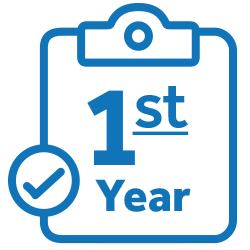 First Year
First Year
The Basics
- Identifying your skills and interests
- Activate your Handshake account and complete your profile. Students with a full profile are five times as likely to be messaged by employers
Build relationships and learn about resources
Resourcefulness is a characteristic employers value.
- Introduce yourself to your peers and faculty—this is called networking in the world of work
- Visit the Career Design Studio and meet with career peer advisors to start or edit your college resume and explore Handshake
- Schedule an appointment to discuss your possible career interests with Career Services
Get involved
College experiences are a good way to build your resume and discover your talents and interests
- Attend the Annual Career Fair
- Get involved in one student club, organization, sport or group
- Get an on-campus job! Review open student employment positions on insideWheaton
- Learn about the Honors program and think about the unique skills you will build
- Learn about Sophomore Experience and consider two options that interest you
Build a foundation for success at Wheaton
What can you do on a regular basis that will keep you on track?
- Check your Wheaton email at least once per day
- Join a Career Community
- Attend an employer event through Handshake
 Second Year
Second Year
This is a good year to start connecting on-campus experiences and courses to career exploration.
The Basics
- Identifying your skills your skills and interests.
- Activate your Handshake account and complete your profile. Students with a full profile are five times as likely to be messaged by employers
- Complete your Sophomore Experience
Build Relationships
Relationships are important for future requests—such as graduate school recommendations and letters of reference for jobs and/or internships.
- Meet with a faculty member in a field of interest and/or a career services staff member to discuss student-faculty research, internships and careers in the field
- Secure an on- or off-campus job. What skills are you building?
- Attend the annual Fall Career Fair and talk with employers
Get Involved
This is also a good time to build cultural and global competencies
- Assess your co-curricular experience: Continue your involvement if it is rewarding. What skills did you develop? Try something new
- Consider study abroad options (Junior Year Abroad, faculty-led-trips, Davis International Fellowship)
- Volunteer for an organization—these opportunities are a great way to meet people with shared values and interests and build career readiness skills
Build a Foundation for Success at Wheaton and beyond
Communicating via Professional Materials
- Edit your resume before applying for Sophomore Experience—add clubs/organizations/volunteer experiences
- Professional LinkedIn—Create a LinkedIn profile that will enable professionals and employers to identify you by your skills and abilities. Refer to the LinkedIn Guide
- Identify and apply for Sophomore Experience opportunities—use this opportunity to build career-ready skills
- Attend a study abroad workshop – build your social and cultural capital
- Meet with Career Services to learn about internships, research and available funding
- Declare your major. Consider the connections between your major and your career interests. Use “What Can I Do with This Major”
- Identify and apply for a summer internship and Wheaton research/internship funding if eligible. Details on Handshake
- Explore national scholarships and fellowships (Watson, Fulbright, Truman, and more)
- Interested in working internationally? Discover GoinGlobal
 Third Year
Third Year
The Basics
- Identifying your skills your skills and interests—join a Career Community
- Activate your Handshake account and complete your profile. Students with a full profile are five times as likely to be messaged by employers
- Create or update your LinkedIn Profile. Connect with alumni. See your Handshake LinkedIn Guide
Build relationships
- Attend the Annual Career Fair
- Begin asking faculty, supervisors, and professional contacts for permission to serve as graduate school and career references. When it is time, share your resume and proposal or job description with recommenders
- Conduct informational interviews (career conversations) with alumni to learn about how the skills you are learning connect with career opportunities after graduation. Work with Career Services and/or Alumni Relations to plan for these
- Send thank you notes and a follow-up email immediately after interview
- Incorporate what you learned in the interview/job shadow in the thank you
- Self-reflect on the interview (What stood out to you? What were three key takeaways? Likes and dislikes?)
Get involved
Think about how you will contribute
- Pursue a leadership opportunity on campus or get more deeply involved with a club or organization. Leading is a trait employers value. Think about how you will contribute
- Use Wheaton funding to attend a conference where you can meet and learn from professionals in your field of interest
- Participate in volunteer work that aligns with your values and interests. In addition to the important work you will do, this will help to build skills and a network of professionals
- Join professional associations based on your career and academic interests. Explore funding to pay for your annual membership
Prepare for your future at Wheaton and beyond
It’s never too early to start building your career plan
- Understand the unique career skills you have learned through your Sophomore Experience, global experience, internships, and campus employment. Add these to your resume
- Update your resume. Is it “you” on paper? Use Resume Guide again as a reference point
- Know what is needed for your internship/research applications: Recruitment timelines in the industry, global vs. domestic
- Tailor cover letters to internships (work with Career Services on cover letters)
- Keep track of your applications and due dates. (Career Services staff member can assist with organizational planning and due dates)
- Practice potential interview questions / schedule a mock interview with Career Services
- Attend an information session on national scholarships and fellowships, graduate or professional school or other post-graduate opportunities
- Begin graduate school application process and entrance exams, if necessary
During/After the Internship:
- Bring a notebook (digital or hard copy); track your questions & answers
- Learn about and use a project management tool/planner
- Inquire about observing / asking questions to professionals in different departments
- Seek out opportunities for networking (ex. company events either in-person or online)
- If able/desired, volunteer to assist with company events, programs, lectures, etc. to gain more experience / show initiative
- Write a personal reflection of your internship once it’s over
- Always send thank you notes (handwritten and/or email) to anyone who helped you (to supervisors, board members, professionals in other departments, professors, etc.)
- Send a LinkedIn invitation to anyone whom you met
What can YOU do to build your career plan?
Independent Research
- Learn about and list job functions that you enjoy (marketing, research, advising)
- List specific job skills needed in the field of interest (technological tools, key skills, languages, content knowledge/courses, research methods, etc.)
- List specific job aspects that interest you (Example: what specific area of medicine am I interested in and why? What is the difference between structural architecture vs. interior architecture and design? What aspect of business interests me, such as sales, marketing, market research, nonprofit management, operations, etc.?)
- Ask Career Services about strengths and personality assessment tools
- Use “What Can I Do with This Major”
- List professional organizations in the field of interest (such as associations)
- List contacts (professors, Wheaton staff members, alumni) with whom to connect via email, in-person during office hours, or virtually
- Explore salary in your field of interest(s): visit Payscale.com
 Fourth Year
Fourth Year
The Basics
- Identifying your skills and interests
- Activate your Handshake account and complete your profile. Students with a full profile are five times as likely to be messaged by employers
- Create or update your LinkedIn Profile. See your Handshake LinkedIn Guide
Build relationships
- Attend a conference to meet and learn from professionals in your field of interest
- Connect with Alumni Relations to update your information as a future Wheaton College graduate and connect with recent graduates in your field
- Join professional organizations to meet peers and professionals in your area of interest
- Continue informational interviews/career conversations with alumni and professionals in your field of interest
Job Applications and Post-Grad
- Follow professional associations, groups, and professionals in your field on LinkedIn
- Create a list of all possible places where you might want to work
- Check company websites for job postings
- Check industry-related job posting sites (hireculture.org, etc.)
- Save and apply to jobs on Handshake (make sure your profile is up-to-date)
- Create a hard-copy or digital portfolio of projects, writing samples, art work/creative works, etc. (you can bring it to an interview)
Get involved
- Attend the Annual Career Fair
- Participate in job fairs, graduate school information sessions, and other career related programming
- Intern over the winter break to build your skills and your professional network
- Subscribe to professional associations newsletters in your field
- Read / watch the news to stay up-to-date on issues/topics in your field of interest
- Volunteer in the area of your interest
- Tap into your network for potential job opportunities and/or paid internships
- LinkedIn, Alumni, previous internship or job supervisor(s), Wheaton faculty and/or staff members, Professional network associations
Prepare for your future
- Continue informational interviews with parents, family friends, alumni, faculty and staff and professionals in the fields of interest
- Update your resume and your LinkedIn and Handshake profiles. Be ready to apply on short notice to any opportunities that interest you
- Begin to monitor the job ads for positions that interest you so that you will understand the skills and experiences that will be expected of you
- Complete applications for scholarships, fellowships and graduate and professional school, if applicable.
- Participate in mock interviews to practice expressing who you are and the skills you bring to potential employers, graduate schools and more
- Respond to the First Destination Survey
- Explore salary in your field of interest(s). Visit payscale.com
- Learn how to negotiate for a good salary and benefits
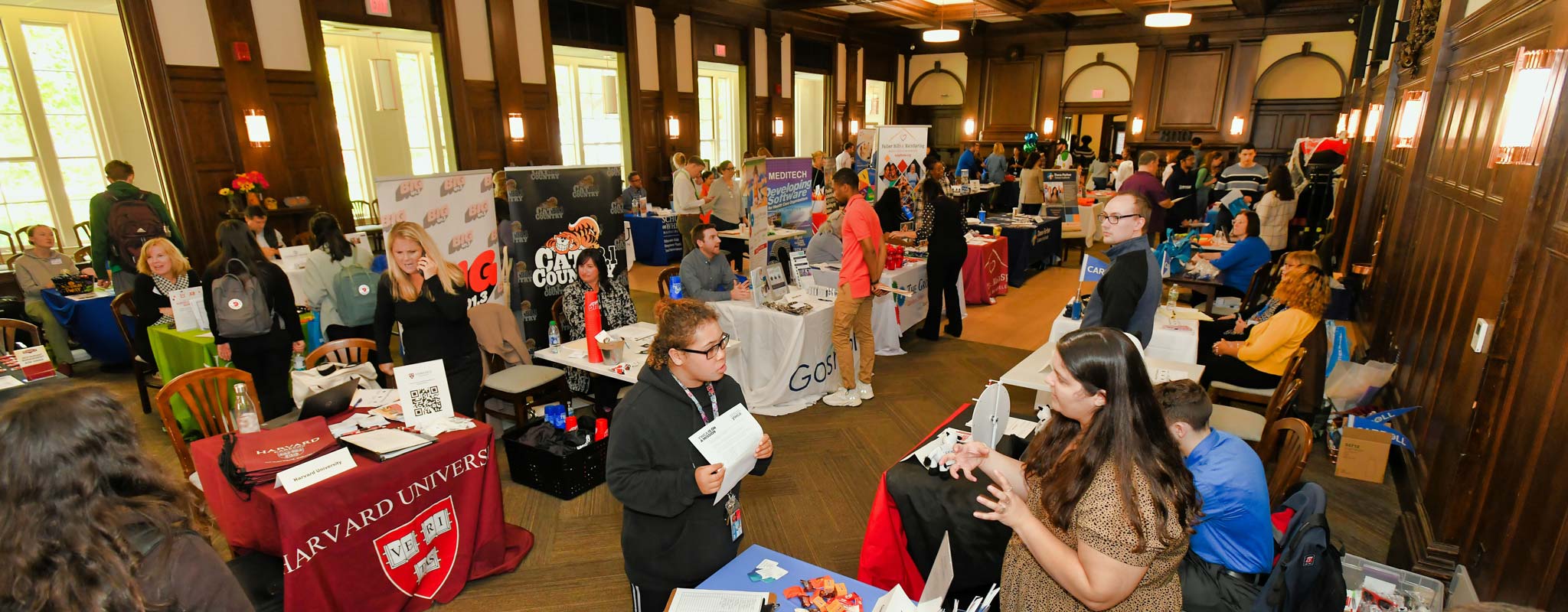
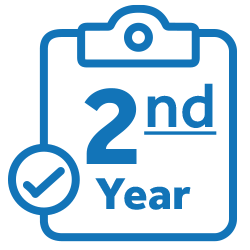 Second Year
Second Year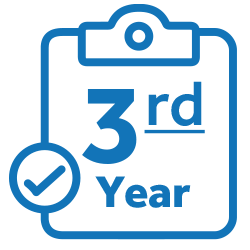 Third Year
Third Year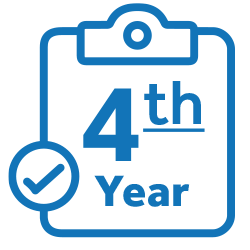 Fourth Year
Fourth Year